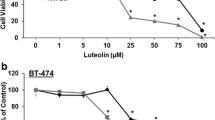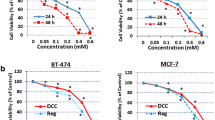Abstract
The effect of R5020 [17,21-dimethyl-19-nor-4,9-pregnadiene-3,20-dione], a synthetic progestin, was studied in the hormone-responsive ZR-75-1 human breast cancer cell line. Following a 12-day incubation with increasing concentrations of R5020, the mitogenic effect of 17β-estradiol (E2,1 nM) was partially (60–80%) antagonized by the progestin, with a half-maximal effective concentration measured at about 30 pM. This effect of R5020 was completely reversed by the addition of physiological concentrations of bovine insulin, as well as by the potent antiprogestin RU486 [17β-hydroxy-11β-(4-dimethylaminophenyl)-17α-(1-propynyl)-4,9-estradien-3-one], but not by the antiandrogen hydroxyflutamide (α,α,α-trifluoro-2-methyl-4′-nitro-m-lactotoluidide). Moreover, the effect of R5020 required the presence of estrogens, thus further indicating a progesterone receptor (PgR)-mediated effect. Low (<100 nM) concentrations of R5020 increased the specific binding of [125I]-insulin up to 2- to 2.5-fold in intact ZR-75-1 cells, an effect which was reversed by RU486. The effect was rapid, being nearly maximal after 24 h of incubation with R5020. The PgR-mediated effect of R5020 on cell proliferation was abolished by the addition of a pure steroidal antiestrogen. The present results suggest a physiological role for progestins in increasing the responsiveness to insulin, which could, in turn, reverse the antiproliferative effect of progestins on estrogen action and thus decrease the efficacy of progestins in the treatment of breast cancer.
Similar content being viewed by others
References
Haller DG, Glick JH: Progestational agents in advanced breast cancer: an overview. Semin Oncol 13: 2–8 (suppl), 1986
Horwitz KB: The structure and function of progesterone receptors in breast cancer. J Steroid Biochem 27: 447–457, 1987
Horwitz KB, Koseki Y, McGuire WL: Estrogen control of progesterone receptor in human breast cancer: role of estradiol and antiestrogens. Endocrinology 103: 1742–1751, 1978
Yu WCY, Leung BS, Gao YL: Effects of 17β-estradiol on progesterone receptors and the uptake of thymidine in human cancer cell line CAMA-1. Cancer Res 41: 5004–5009, 1981
Poulin R, Labrie F: Stimulation of cell proliferation and cstrogenic response by adrenal C19−Δ5 steroids in the ZR-75-1 human breast cancer cell line. Cancer Res 46: 4933–4937, 1986
Reiner GCA, Katzenellenbogen BS: Characterization of estrogen and progesterone receptors and the dissociated regulation of growth and progesterone receptor stimulation by estrogen in MDA-MB-134 human breast cancer cells. Cancer Res 46: 1124–1131, 1986
Vignon F, Bardon F, Chalbos D, Rochefort H: Antiestrogenic effect of R5020, a synthetic progestin in human breast cancer cells in culture. J Clin Endocrinol Metab 56: 1124–1130, 1983
Horwitz KB, Mockus MB, Lessey BA: Variant T47D human breast cancer cells with high progesterone-receptor levels despite estrogen and antiestrogen resistance. Cell 28: 633–642, 1982
Horwitz KB, Freidenberg GR: Growth inhibition and increase of insulin receptors in antiestrogen-resistant T47Dco human breast cancer cells by progestins: implications for endocrine therapies. Cancer Res 45: 167–173, 1985
Gill PG, Vignon F, Bardon S, Derocq D, Rochefort H: Difference between R5020 and the antiprogestin RU486 in antiproliferative effects on human breast cancer cells. Breast Cancer Res Treat 10: 37–45, 1987
Hissom JR, Moore MR: Progestin effects on growth in the human breast cancer cell line T-47D. Possible therapeutic applications. Biochem Biophys Res Commun 145: 706–711, 1987
Engel LW, Young NA, Troika TS, Lippman ME, O'Brien SJ, Joyce MY: Establishment and characterization of three new continuous cell lines derived from human breast carcinomas. Cancer Res 38: 3352–3364, 1978
Allegra JC, Lippman ME: The effects of 17β-estradiol and tamoxifen on the ZR-75-1 human breast cancer cell line in defined medium. Eur J Cancer 16: 1007–1015, 1980
Poulin R, Baker D, Labrie F: Androgens inhibit basal and estrogen-induced cell proliferation in ZR-75-1 human breast cancer cells. Breast Cancer Res Treatment 12: 213–223, 1988
Osborne CK, Monaco ME, Kahn CR, Huff K, Bronzert D, Lippman ME: Direct inhibition of growth and antagonism of insulin action by glucocorticoids in human breast cancer cells in culture. Cancer Res 39: 2422–2428, 1979
Neri R, Peets E, Watnick A: Antiandrogenecity of flutamide and its metabolite Scn 164243. Biochem Soc Trans 7: 565–569, 1979
Simard J, Luthy I, Guay J, Bélanger A, Labrie F: Characteristics of the interaction of the antiandrogen flutamide with the androgen receptor in various target tissues. Mol Cell Endocrinol 44: 261–270, 1986
Philibert D: RU38486: an original multifaceted antihormone in vivo. In Agarwal MK (ed): Adrenal steroid antagonism. Walter de Gruyter, Berlin, 1984, pp 77–101
Wakeling AE, Bowler J: Steroidal pure antiestrogens. J Endocrinol 112: R7-R10, 1987
Berthois Y, Katzenellenbogen JA, Katzenellenbogen BS: Phenol red in tissue culture media is a weak estrogen: implications concerning the study of estrogen-responsive cells in culture. Proc Natl Acad Sci USA 83: 2496–2500, 1986
Hubert JF, Vincent A, Labrie F: Estrogenic activity of phenol red in rat anterior pituitary cells in culture. Biochem Biophys Res Commun 141: 885–891, 1986
Osborne CK, Monaco ME, Lippman ME, Kahn CR: Correlation among insulin binding, degradation and biological activity in human breast cancer cells in long-term tissue culture. Cancer Res 38: 94–102, 1978
Scatchard G: The attraction of proteins for small molecules and ions. Ann NY Acad Sci 51: 660–672, 1949
Taylor CM, Blanchard B, Zava DT: A simple method to determine whole cell uptake of radiolabelled oestrogen and progesterone and their subcellular localization in breast cancer cell lines in monolayer cultures. J Steroid Biochem 20: 1083–1088, 1984
Rodbard D: Apparent positive cooperative effect in cyclic AMP and corticosterone production by isolated adrenal cells in response to ACTH analogues. Endocrinology 94: 1427–1437, 1974
Read LD, Snider CE, Miller JS, Greene GL, Katzenellenbogen BS: Ligand-modulated regulation of progesterone receptor messenger ribonucleic acid and protein in human breast cancer cell lines. Mol Endocrinol 2: 263–271, 1988
De Meyts P, Roth J, Neville Jr DM, Gavin JR III, Lesnick MA: Insulin interactions with its receptors: experimental evidence for negative cooperativity. Biochem Biophys Res Commun 55: 154–161, 1975
Wheeler FB, Santora II AC, Elsas II LJ: Evidence supporting a two-receptor model for insulin binding by cultured embryonic breast cells. Endocrinology 197: 195–207, 1980
Mountjoy KG, Finlay GJ, Holdaway IM: Abnormal insulin-receptor down-regulation and dissociation of downregulation from insulin biological action in cultured human tumor cells. Cancer Res 47: 6500–6504, 1987
Goldfine ID: The insulin receptor: molecular biology and transmembrane signaling. Endocr Rev 8: 235–255, 1987
Rosen DM: After insulin binds. Science 237: 1452–1458. 1987
Smith RG, Symc AJ, Naez A, Lerner S, Norris JS: Mechanism of glucocorticoid regulation of growth of the androgen-sensitive prostate-derived R3327H-G8-A1 tumor cell line. J Biol Chem 260: 12454–12463, 1985
Rao KVS, Williams RE, Fox CF: Altered glucocorticoid binding and action in response to epidermal growth factor in HBL100 cells. Cancer Res 47: 5888–5893, 1987
Rao KVS, Fox CF: Epidermal growth factor stimulates phosphorylation of human glucocorticoid receptor in cultured cells. Biochem Biophys Res Commun 144: 512–519, 1987
Woo DDL, Fay SP, Griest RE, Coty WA, Goldfine L, Fox CL: Differential phosphorylation of the progesterone receptor by insulin, epidermal growth factor and plateletderived growth factor receptor tyrosine kinases. J Biol Chem 261: 460–467, 1986
Rao KVS, Perutta WD, Greene GL, Fox CF: Cellular progesterone receptor phosphorylation in response to ligands activating protein kinases. Biochem Biophys Res Commun 146: 1357–1365, 1987
Murphy LC, Murphy LJ, Shiu RPC, Bell GI: Progestins regulate the expression of the epidermal growth factor gene in human breast cancer. 70th Annual Meeting of the Endocrine Society, New Orleans, LA 1988, 1988, abstract 45
Murphy LJ, Sutherland RL, Stead B, Murphy LC, Lazarus L: Progestin regulation of epidermal growth factor receptor in human mammary carcinoma cells. Cancer Res 46: 728–734, 1986
Nardulli AM, Greene GL, O'Malley BW, Katzenellenbogen BS: Regulation of progesterone receptor messenger ribonucleic acid and protein levels in MCF-7 cells by estradiol: analysis of estrogen's effect on progesterone receptor synthesis and degradation. Endocrinology 122: 935–944, 1988
Wei LL, Krett NL, Francis MD, Gordon DF, Wood WM, O'Malley BW, Horwitz KB: Multiple human progesterone receptor messenger ribonucleic acids and their autoregulation by progestin agonists and antagonists in breast cancer cells. Mol Endocrinol 2: 62–72, 1988
Mauvais-Jarvis P, Kuttenn F, Gompel A: Antiestrogen action of progesterone in breast tissue. Breast Cancer Res Treat 8: 174–187, 1986
Chalbos D, Rochefort H: Dual effects of the progestin R5020 on proteins released by the T47D human breast cancer cells. J Biol Chem 259: 1231–1238, 1984
Gagné D, Pons M, Crastes de Paulet A: Analysis of the relation between receptor binding affinity and antagonist efficacy of antiglucocorticoids. J Steroid Biochem 25: 315–322, 1986
Gagné D, Pons M, Philibert D: RU38486: a potent antiglucocorticoidin vitro andin vivo. J Steroid Biochem 23: 247–251, 1985
Gompel A, Malet C, Spritzer P, Lalardrie JP, Kuttenn F, Mauvais-Jarvis M: Progestin effect on cell proliferation and 17β-hydroxysteroid dehydrogenase activity in normal human breast cells in culture. J Clin Endocrinol Metab 63: 1174–1180, 1986
Horwitz KB: The antiprogestin RU38486: receptor-mediated progestin versus antiprogestin actions screened in estrogen-insensitive T47Dco human breast cancer cells. Endocrinology 116: 2236–2245, 1985
MacIndoe JH, Etre LA: An antiestrogenic action of androgens in human breast cancer cells. J Clin Endocrinol Metab 53: 836–842, 1981
Murphy LJ, Murphy LC, Stead B, Sutherland RL, Lazarus L: Modulation of lactogenic receptors by progestins in cultured human breast cancer cells. J Clin Endocrinol Metab 62: 280–287, 1986
Author information
Authors and Affiliations
Rights and permissions
About this article
Cite this article
Poulin, R., Dufour, J.M. & Labrie, F. Progestin inhibition of estrogen-dependent proliferation in ZR-75-1 human breast cancer cells: Antagonism by insulin. Breast Cancer Res Tr 13, 265–276 (1989). https://doi.org/10.1007/BF02106576
Issue Date:
DOI: https://doi.org/10.1007/BF02106576




